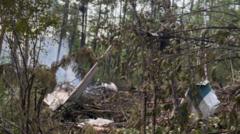Air India, the national carrier of India, is taking significant steps to stabilize its operations following the crash that occurred on June 12, which involved a Boeing 787 Dreamliner shortly after takeoff from Ahmedabad. In a statement on X, the airline revealed it would be reducing international flights by 15 percent, specifically affecting its fleet of wide-body aircraft used for long-haul travel. This measure is expected to remain in place until mid-July.
The crash has prompted an influx of passenger complaints regarding cancelled flights, malfunctioning cabin devices, and inadequate communication from the airline. Furthermore, the ongoing airspace closure over Iran due to geopolitical tensions has complicated flight routes and contributed to further delays.
India's Directorate General of Civil Aviation (DGCA) conducted technical inspections of Air India's fleet of 33 Dreamliners and, while finding no major safety concerns, identified maintenance-related issues. The regulator has urged the airline to enhance internal coordination between its engineering, operations, and ground handling units. Additionally, improving communication with passengers regarding real-time updates and flight information has been emphasized.
With a fleet of 128 aircraft and operating roughly 1,000 flights daily, including sought-after routes such as Delhi to New York, Air India's operational changes are critical to regaining passenger confidence amidst this tumultuous period. The airline has cleared 26 of the inspected planes but continues to face challenges in restoring its reputation as a reliable carrier.
The crash has prompted an influx of passenger complaints regarding cancelled flights, malfunctioning cabin devices, and inadequate communication from the airline. Furthermore, the ongoing airspace closure over Iran due to geopolitical tensions has complicated flight routes and contributed to further delays.
India's Directorate General of Civil Aviation (DGCA) conducted technical inspections of Air India's fleet of 33 Dreamliners and, while finding no major safety concerns, identified maintenance-related issues. The regulator has urged the airline to enhance internal coordination between its engineering, operations, and ground handling units. Additionally, improving communication with passengers regarding real-time updates and flight information has been emphasized.
With a fleet of 128 aircraft and operating roughly 1,000 flights daily, including sought-after routes such as Delhi to New York, Air India's operational changes are critical to regaining passenger confidence amidst this tumultuous period. The airline has cleared 26 of the inspected planes but continues to face challenges in restoring its reputation as a reliable carrier.



















